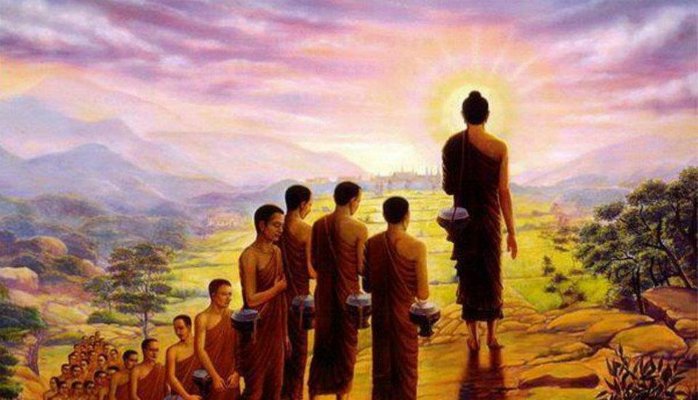Verse 43: Not a mother, nor a father, nor any other relative can do more for the well-being of one than a rightly-directed mind can.
- seyyaso: still better; here it means much better service; because it (the rightly-directed mind) can lead one to the well-being of a man and of a deva and even to the realization of Nibbana.
The Story of Soreyya
While residing at the Jetavana monastery, the Buddha uttered Verse (43) of this book, with reference to Soreyya, the son of a rich man of Soreyya city.
On one occasion, Soreyya accompanied by a friend and some attendants was going out in a luxurious carriage for a bath. At that moment, Thera Mahakaccayana was adjusting his robes outside the city, as he was going into the city of Soreyya for alms-food. The youth Soreyya, seeing the golden complexion of the thera, thought, “How I wish the thera were my wife, or else that the complexion of my wife were like that of his.” As the wish arose in him, his sex changed and he became a woman. Very much ashamed, he got down from the carriage and ran away, taking the road to Taxila. His companions missing him, looked for him, but could not find him.
Soreyya, now a woman, offered her signet ring to some people going to Taxila, to allow her to go along with them in their carriage. On arrival at Taxila, her companions told a young rich man of Taxila about the lady who came along with them. The young rich man, finding her to be very beautiful and of a suitable age for him, married her. As a result of this marriage two sons were born; there were also two sons from the previous marriage of Soreyya as a man.
One day, a rich man’s son from the city of Soreyya came to Taxila with five hundred carts. Lady-Soreyya recognizing him to be an old friend sent for him. The man from Soreyya city was surprised that he was invited, because he did not know the lady who invited him. He told the lady-Soreyya that he did not know her, and asked her whether she knew him. She answered that she knew him and also enquired after the health of her family and other people in Soreyya city. The man from Soreyya city next told her about the rich man’s son who disappeared mysteriously while going out for a bath. Then the Lady-Soreyya revealed her identity and related all that had happened, about the wrongful thoughts with regard to Thera Mahakaccayana, about the change of sex, and her marriage to the young rich man of Taxila. The man from the city of Soreyya then advised the lady-Soreyya to ask pardon of the thera. Thera Mahakaccayana was accordingly invited to the home of Soreyya and alms-food was offered to him. After the meal, the lady-Soreyya was brought to the presence of the thera, and the man from Soreyya told the thera that the lady was at one time the son of a rich man from Soreyya city. He then explained to the thera how Soreyya was turned into a female on account of his wrongful thoughts towards the respected thera. Lady-Soreyya then respectfully asked pardon of Thera Mahakaccayana. The thera then said, “Get up, I forgive you.” As soon as these words were spoken, the woman was changed back to a man. Soreyya then pondered how within a single existence and with a single body he had undergone change of sex and how sons were born to him, etc. And feeling very weary and repulsive of all these things, he decided to leave the household life and joined the Order under the thera.
After that, he was often asked, “Whom do you love more, the two sons you had as a man or the other two you had as a wife?” To them, he would answer that his love for those born of the womb was greater. This question was put to him so often, he felt very much annoyed and ashamed. So he stayed by himself and with diligence, contemplated the decay and dissolution of the body. He soon attained arahatship together with the Analytical Insight. When the old question was next put to him he replied that he had no affection for any one in particular. Other bhikkhus hearing him thought he must be telling a lie. When reported about Soreyya giving a different answer, the Buddha said, “My son is not telling lies, he is speaking the truth. His answer now is different because he has now realized arahatship and so has no more affection for anyone in particular. By his well-directed mind my son has brought about in himself a well-being which neither the father nor the mother can bestow on him.”
Then the Buddha spoke in verse as follows:
Verse 43: Not a mother, nor a father, nor any other relative can do more for the well-being of one than a rightly-directed mind can.
At the end of the discourse many attained Sotapatti Fruition.
End of Chapter Three: The Mind (Cittavagga)
Dhammapada Verse 43
Soreyya Vatthu
Na tam mata pita kayira
anne vapi ca nataka
sammapanihitam cittam
seyyaso1naim tato kare.
Source: Tipitaka








Add a comment